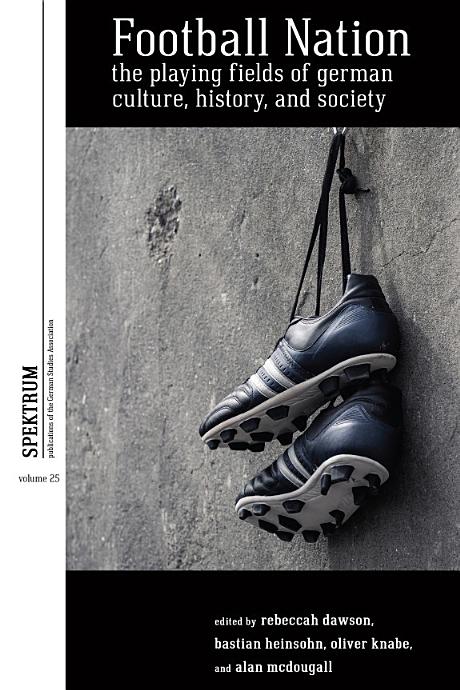
This month’s odd-ball time of year for World Cup broadcasts from Qatar may cramp his viewing style, but Dr. Alan McDougall is still keen to catch as much of the ongoing 2022 tournament as he can.
As soccer fans were gearing up for this year’s World Cup – including only the second-ever appearance of a Canadian squad – McDougall was eyeing the German team’s prospects, a perennial interest for the University of Guelph history professor.
This year brings publication of Football Nation: The Playing Fields of German Culture, History and Society (Berghahn Books), a new volume co-edited by McDougall, a professor in the College of Arts. The book consists of essays by international academics on aspects of German soccer, culture and politics.
Its sections cover soccer as a vehicle for international cultural exchange; race and otherness; class and gender; and German fandom and spectatorship.
That range reflects the scope of the game itself, not only in Germany but worldwide, said McDougall. “One great thing about football is that it transcends political borders.”
At the same time, he acknowledged that politics and the World Cup are inevitably bound together; witness his numerous media commentaries this fall about human rights concerns in the host country.
A look at one of the world’s most successful national soccer teams
McDougall said the new book offers a view into both the game and the nation, which have been intertwined since Germany won its first World Cup in 1954. Germany has fielded one of the most successful national teams, with subsequent World Cup wins in 1974, 1990 and 2014.
He said this year’s team is “not at its peak.” Still, said McDougall, “it’s a cliché in the English-speaking world to avoid betting against Germany. They’re always a strong team.”
The new book links that strength on the pitch with the country’s sense of itself in cultural and political terms, including its post-World War II development into today’s leadership role within the European Union.
That 1954 win made the world pay attention to Germany as a soccer nation, said McDougall.
“Football is central to German national life today,” he said. “Anyone who loves ‘the beautiful game’ will be interested in German football history.”
Soccer – and film, media, identity and fandom – covered in volume’s chapters
Looking at aspects of that history is the purpose of the new volume.
The book includes a chapter by McDougall on the international history of East German football as well as an introduction written with his co-editors: Dr. Bess Dawson, professor of German studies at the University of Kentucky; Bastian Heinsohn, German professor at Bucknell University; and Oliver Knabe, lecturer of German at the University of Dayton.
The volume stems from a workshop on German soccer led by the group at the 2019 conference of the German Studies Association.
Contributors to Football Nation cover topics including racism, media, identity, fandom and the importance of soccer in German society. In a popular culture turn, the book includes chapters on the 1973 soccer musical Don’t Cheat, Darling! directed by the East German filmmaker Joachim Hasler, and on a 1927 silent sports film called The Eleven Devils, directed by the Hungarian-born screenwriter and director Zoltan Korda.
Among his earlier books, McDougall published The People’s Game: Football, State and Society in East Germany in 2014 and Contested Fields: A Global History of Modern Football in 2020. Educated at Oxford University, he joined U of G’s College of Arts in 2002.
Contact:
Dr. Alan McDougall
amcdouga@uoguelph.ca
Contact:
Dr. Alan McDougall
amcdouga@uoguelph.ca
